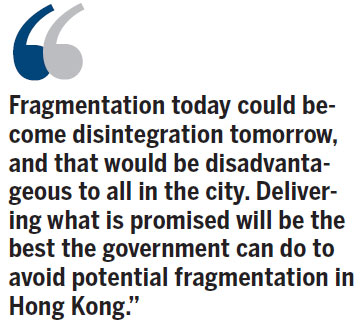Avoid fragmentation in HK
Updated: 2013-08-10 08:23
By Li Kui-wai(HK Edition)
|
|||||||

Looking at Hong Kong's current problems, one may start worrying whether or not the city is fragmenting; socially, politically and economically.
Consider the volume of complaints and grievances at all levels from different sectors of the population. At the family level, the death of one celebrity resulted in his children and their stepmother fighting for the will. Recently, three brothers from a big family business listed on the stock market fought for shares and authority in their business. In the property sector, the announcement of an annual supply of 85,000 units was bad timing as it coincided with the fall of the property market. Property holders grumbled as the property price plummeted, while property developers could not sell as there was market overlap between government supplies in the form of the home ownership scheme and private supplies in similar size properties. The bankruptcy rate jumped, though it was argued that the mild penalty from bankruptcy would have been exploited so as to get rid of debts in a short period of time.
Environmentalists complained and recommended no further developments, including the lowering of tall buildings, using less energy, reducing the amount of garbage and so on, despite the city being a business and tourist center, where even the Disneyland and fast food restaurants would have generated much garbage on a daily basis. It has turned into environmental protectionism that might have reduced development potential in Hong Kong. Much of the business sector is still talking about investment on the Chinese mainland, knowing that investment in Hong Kong is drying out. Recently, one vocal business person even complained openly that our financial secretary has not been doing his part. On the contrary, the labor sector has successfully fought for the minimum wage, and it is yet to see if it hurts Hong Kong's competitiveness if wages are not paid according to productivity.
As a result of economic hardship, government policies have become oriented to solve short-term ills, rather than a long-term strategic path for the economy. It has become popular to talk about economic integration with the mainland economy, but the difference in economic systems will need time to merge. Welfare expenditure keeps rising, and its advocates still complain of a lack of welfare expenditure and subsidies. If nothing more long-term is done, the Hong Kong economy is turning from an external-oriented to an internal-oriented economy, whereby our physical export is falling, as industrially we become a vacuum, and depend narrowly on the property and financial sectors only. And when our fiscal surplus has been dried out by greater government expenditure, Hong Kong could soon become a "dependent" economy.

There have certainly been many debates and demonstrations on the political front. Instead of consolidating the Hong Kong system, governance in Hong Kong has often been personality-driven and cases of cronyism have been identified. The "One Country, Two Systems" framework is meant to promote, preserve and consolidate Hong Kong's capitalist system, yet different leaders may interpret the concept differently.
Hong Kong would be fragmenting if grievances were allowed to cumulate. At the government level, governance must be strengthened, and political promises should not be deliberately missed or not delivered. The government should be seen to be proactive, and not shy away from responsibilities, it should be bold, creative and forward-looking rather than relying on cronies for protection. Two wrongs do not make a right. All over the world, there are cases where governments make mistakes, but correcting mistakes and getting on to the right footing is more important in administration. Making mistakes leads to unpopularity, but correcting mistakes and doing the right thing would revise a leader's popularity and charisma.
Hong Kong has been a success in the economic arena. Businesses have been exploiting Hong Kong's openness, proximity to the mainland and the favorable fiscal scene for their own advantage. Businesses should be apolitical and not personality-driven. It is the system in Hong Kong that should be cherished, not who happens to be our financial secretary. Creative business leaders should look for opportunities in Hong Kong, both outwards and inwards. In short, businesses should do their part in promoting Hong Kong to their advantage, consider Hong Kong as their economic base, think in terms of Hong Kong's long-term survival and benefit, rather than where else can compete with the city.
Various professions and the young generation, the so-called "post-80s", should have their vision of Hong Kong, be prepared to fight unfairness, and ready to defend Hong Kong's system on all fronts. The society comprises individuals, but it is the behavior of the majority that shapes the society. In a nutshell, we all have to do our own part. In economic terms, we have to take up our private, individual cost and responsibility. Problems will cumulate once we ignore our individual cost and responsibility, and instead, push our private cost onto society and, in turn, lead to a rise in social cost and burden.
Hong Kong cannot be fragmented socially, economically and politically. Fragmentation today could become disintegration tomorrow, and that would be disadvantageous to all in the city. Delivering what is promised will be the best the government can do to avoid potential fragmentation in Hong Kong. Let's create virtuous circles, and not vicious circles in all aspects.
The author is associate professor of the Department of Economics and Finance at City University of Hong Kong.
(HK Edition 08/10/2013 page1)